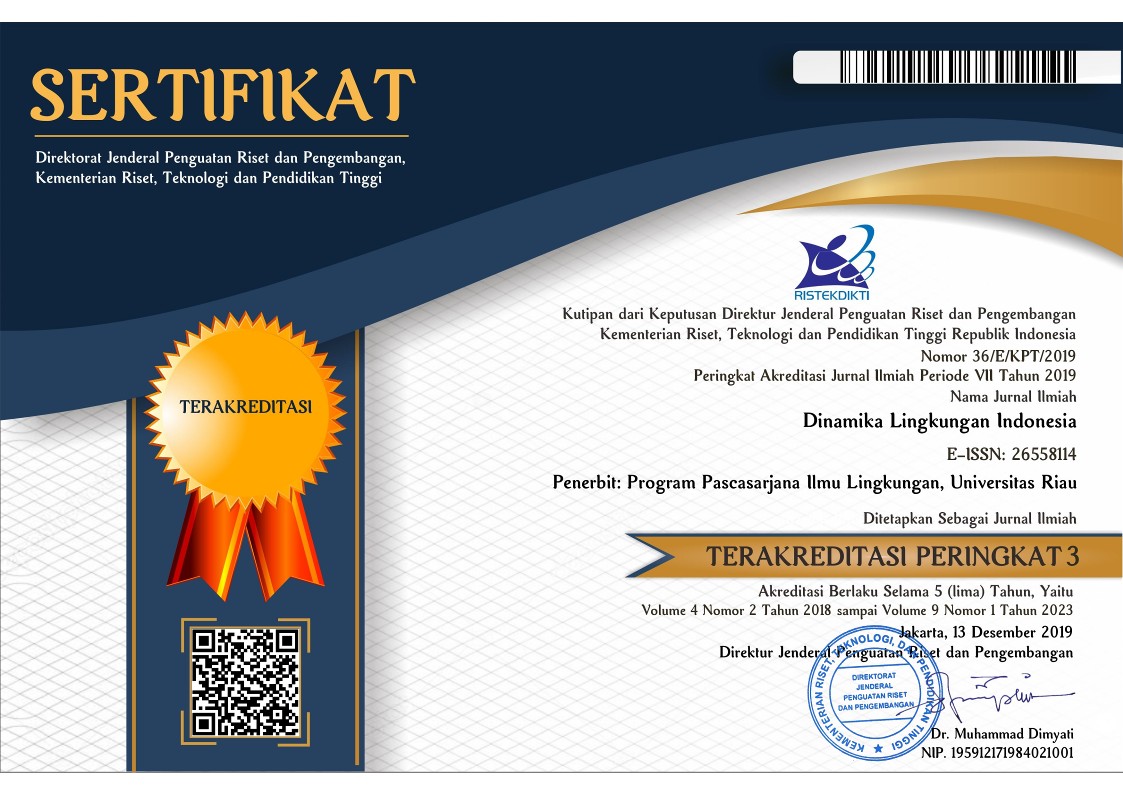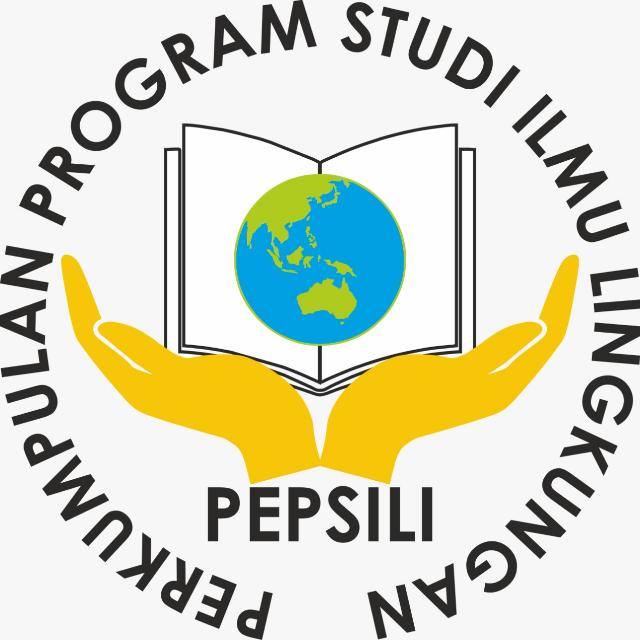Potensi dan Tantangan Pemulung Menuju Ekonomi Sirkular di Kota Jambi
Abstract
Waste pickers in Jambi city reduce solid waste by collecting and sorting recycled waste at the ‘Solid Waste Temporary Shelters’ or Tempat Pembuangan Sementara (TPS). However, most waste pickers cannot improve their performance due to challenges confronting waste pickers and lack of attention from the government and the public. This research identified and quantified the solid waste collected and marketed by individual waste pickers and collectors ‘pengepul’. Convenience sampling methods with literature reviews, questionnaires, and interviews were carried out in this study. Most respondents were male waste pickers, 67%, and women, 33% (n=100). The average daily collection rate of male waste pickers is 10.43 kg/day. For female waste, pickers are 7.92 kg/day (waste category: plastic bottles, cardboard, and wastepaper), with an estimated recycling rate of 0.09%-0.89%. Meanwhile, collectors have an average sales rate of 2-5.5 tons/month, with an estimated recycling rate of 1.5%. The recycling value of waste pickers and collectors could be more optimal, impacting the average income of waste pickers Rp. 581,250/month which showed that the market is neither profitable nor socially protected. The research findings could help develop a waste pickers' integrated system to improve the implementation of the circular economy.
Keywords
Full Text:
PDFReferences
Afon, A. (2012). A survey of operational characteristics, socioeconomic and health effects of scavenging activity in Lagos, Nigeria. Waste Management & Research: The Journal for a Sustainable Circular Economy, 30(7), 664–671. https://doi.org/10.1177/0734242X12444894.
Alfiyah, N. (2021). Pandemi dan Meningkatnya Sampah Plastik. https://econusa.id/id/ecoblog/pandemi-dan-meningkatnya-sampah-plastik/.
Asim, M., Batool, S. A., & Chaudhry, M. N. (2012). Scavengers and their role in the recycling of waste in Southwestern Lahore. Resources, Conservation and Recycling, 58, 152–162. https://doi.org/10.1016/j.resconrec.2011.10.013.
Aslam, S. (2020). Sustainable Collaboration; Transforming Alliances for EPR in non-OECD Context: A case of Pakistan. IIIEE Master Thesis, October.https://doi.org/10.13140/RG.2.2.32086.68166/1.
Barford, A., & Ahmad, S. R. (2021). A Call for a Socially Restorative Circular Economy: Waste Pickers in the Recycled Plastics Supply Chain. Circular Economy and Sustainability, 1(2), 761–782. https://doi.org/10.1007/s43615-021-00056-7.
BPS Kota Jambi. (2021). Kota Jambi Dalam Angka Tahun 2021. https://jambikota.go.id
Colombijn, F., & Morbidini, M. (2017). Pros and cons of the formation of waste-pickers’ cooperatives: a comparison between Brazil and Indonesia. Decision, 44(2), 91–101. https://doi.org/10.1007/s40622-017-0149-5.
da Silva, C. L., & Bolson, C. (2018). Public policy for solid waste and the organization of waste pickers: Potentials and limitations to promote social inclusion in Brazil. Recycling, 3(3). https://doi.org/10.3390/recycling3030040.
da Silva, C. L., Weins, N., & Potinkara, M. (2019). Formalizing the informal? A perspective on informal waste management in the BRICS through the lens of institutional economics. Waste Management, 99, 79–89. https://doi.org/10.1016/j.wasman.2019.08.023.
David, V. E., John, Y., & Hussain, S. (2020). Rethinking sustainability: a review of Liberia’s municipal solid waste management systems, status, and challenges. Journal of Material Cycles and Waste Management, 22(5), 1299–1317. https://doi.org/10.1007/s10163-020-01046-x.
Dias, S. M. (2016). Waste pickers and cities. Environment and Urbanization, 28(2), 375–390. https://doi.org/10.1177/0956247816657302.
Febrino, A., & Rahardyan, B. (2015). Pengaruh Integrasi Sektor Formal Dan Sektor Informal Terhadap Pengolahan Dan Pemanfaatan Sampah Di Tempat Penampungan Sementara. Jurnal Tehnik Lingkungan, 21(1), 28–38. https://doi.org/10.5614/jtl.2015.21.1.4.
Fidelis, R., Marco-ferreira, A., Cristina, L., & Kenji, A. (2020). Resources , Conservation & Recycling Socio-productive inclusion of scavengers in municipal solid waste management in Brazil : Practices , paradigms and future prospects. Resources, Conservation & Recycling, 154. https://doi.org/10.1016/j.resconrec.2019.104594.
Fuss, M., Barros, R. T. V, & Poganietz, W. (2021). The role of a socio-integrated recycling system in implementing a circular economy – The case of Belo Horizonte , Brazil. Waste Management, 121, 215–225. https://doi.org/10.1016/j.wasman.2020.12.006.
Gutberlet, J., Sorroche, S., Martins Baeder, A., Zapata, P., & Zapata Campos, M. J. (2021). Waste Pickers and Their Practices of Insurgency and Environmental Stewardship. Journal of Environment and Development, 30(4), 369–394. https://doi.org/10.1177/10704965211055328.
Husen, V. B., Halim, R., & Perdana, S. M. (2021). Gambaran Pengelolaan Bank Sampah Dream Dalam Mengurangi Timbulan Sampah Anorganik Di Perumahan Bcl 5 Kota Jambi. Electronic Journal Scientific of Environmental Health And Disease, 2(1), 40–51. https://doi.org/10.22437/esehad.v2i1.13751.
Kementerian Perencanaan Pembangunan Nasional. (2022). The Future is Circular: Langkah Nyata Inisiatif Ekonomi Sirkular di Indonesia. 170.
Knickmeyer, D. (2020). Social factors influencing household waste separation: A literature review on good practices to improve the recycling performance of urban areas. Journal of Cleaner Production, 245, 118605.
https://doi.org/10.1016/j.jclepro.2019.118605.
Kristanto, G. A., Kemala, D., & Nandhita, P. A. C. (2022). Challenges confronting waste pickers in Indonesia: An on-field analysis. Waste Management and Research, 40(9), 1381–1389. https://doi.org/10.1177/0734242X211029181.
Kuah, A. T. H., & Wang, P. (2020). Circular economy and consumer acceptance: An exploratory study in East and Southeast Asia. Journal of Cleaner Production, 247, 119097. https://doi.org/10.1016/j.jclepro.2019.119097.
Lahti, T., Wincent, J., & Parida, V. (2018). A definition and theoretical review of the circular economy, value creation, and sustainable business models: Where are we now and where should research move in the future? Sustainability (Switzerland), 10(8). https://doi.org/10.3390/su10082799.
Luthra, A. (2020). Efficiency in waste collection markets : Changing relationships between firms , informal workers, and the state in urban India. Economi and Space, 0(0), 1–20. https://doi.org/10.1177/0308518X20913011.
Milburn, C. L. (2020). The Circular Economy and Extended Producer Responsibility. City of Ottawa, 1–4.
Morais, J., Corder, G., Golev, A., Lawson, L., & Ali, S. (2022). Global review of human waste-picking and its contribution to poverty alleviation and a circular economy. Environmental Research Letters, 17(6).https://doi.org/10.1088/17489326/ac6b49.
Navarrete-Hernandez, P., & Navarrete-Hernandez, N. (2018). Unleashing Waste-Pickers’ Potential: Supporting Recycling Cooperatives in Santiago de Chile. World Development, 101, 293–310. https://doi.org/10.1016/j.worlddev.2017.08.016.
Putra, H. P., Damanhuri, E., & Sembiring, E. (2019). Sektor Baru Pengelolaan Sampah Di Indonesia. Jurnal Sains Dan Teknologi Lingkungan, 11(November 2018), 11–24.
Priti, & Mandal, K. (2019). Review on evolution of municipal solid waste management in India: practices, challenges and policy implications. Journal of Material Cycles and Waste Management, 21(6), 1263–1279. https://doi.org/10.1007/s10163-019-00880-y.
Rahardyan, B. (2007). Di Kota Bandung Plastic Waste Flow Analysis As The Determinant Of The Recycling Infrastructure Capacity In Bandung City. Jurnal Purifikasi, 8(2).
Rathore, P., & Sarmah, S. P. (2020). Economic, environmental and social optimization of solid waste management in the context of circular economy. Computers and Industrial Engineering, 145(February), 106510. https://doi.org/10.1016/j.cie.2020.106510.
Ribeiro Siman, R., Yamane, L. H., de Lima Baldam, R., Pardinho Tackla, J., de Assis Lessa, S. F., & Mendonça de Britto, P. (2020). Governance tools: Improving the circular economy through the promotion of the economic sustainability of waste picker organizations. Waste Management, 105, 148–169. https://doi.org/10.1016/j.wasman.2020.01.040.
Salmenperä, H., Pitkänen, K., Kautto, P., & Saikku, L. (2021). Critical factors for enhancing the circular economy in waste management. Journal of Cleaner Production, 280. https://doi.org/10.1016/j.jclepro.2020.124339.
Sasaki, S., Araki, T., Tambunan, A. H., & Prasadja, H. (2014). Household income, living and working conditions of dumpsite waste pickers in Bantar Gebang: Toward integrated waste management in Indonesia. Resources, Conservation and Recycling, 89(February 2018), 11–21. https://doi.org/10.1016/j.resconrec.2014.05.006.
Steuer, B., Ramusch, R., & Salhofer, S. P. (2018). Can Beijing’s informal waste recycling sector survive amidst worsening circumstances? Resources, Conservation and Recycling, 128(September 2017), 59–68. https://doi.org/10.1016/j.resconrec.2017.09.026.
Talbott, C. (2022). Can the circular economy deliver a just transition? Ethical Trading Initiative. https://www.ethicaltrade.org/blog/can-circular-economy-deliver-just-transition.
Tamine, I., Miranda, P., Fidelis, R., Aline, D., Fidelis, D. S., Pilatti, L. A., & Picinin, C. T. (2020). The Integration of Recycling Cooperatives in the Formal Management of Municipal Solid Waste as a Strategy for the Circular Economy — The Case of. Sustainability (Switzerland), 10513(2), 1–22.
Tucker, J. L., & Anantharaman, M. (2020). Informal Work and Sustainable Cities: From Formalization to Reparation. One Earth, 3(3), 290–299. https://doi.org/10.1016/j.oneear.2020.08.012.
Uddin, S. M. N., Gutberlet, J., Ramezani, A., & Nasiruddin, S. M. (2020). Experiencing the Everyday of Waste Pickers: A Sustainable Livelihoods and Health Assessment in Dhaka City, Bangladesh. Journal of International Development, 32(6), 833–853. https://doi.org/10.1002/jid.3479.
Villalba Ferreira, M., Dijkstra, G., Scholten, P., & Sucozhañay, D. (2022). The effectiveness of inter-municipal cooperation for integrated sustainable waste management: A case study in Ecuador. Waste Management, 150(January), 208–217. https://doi.org/10.1016/j.wasman.2022.07.008.
Xu, Z., Elomri, A., Pokharel, S., Zhang, Q., Ming, X. G., & Liu, W. (2017). Global reverse supply chain design for solid waste recycling under uncertainties and carbon emission constraint. Waste Management, 64, 358–370. https://doi.org/10.1016/j.wasman.2017.02.024.
Yousafzai, M. T., Nawaz, M., Xin, C., Tsai, S. B., & Lee, C. H. (2020). Sustainability of waste picker sustainopreneurs in Pakistan’s informal solid waste management system for cleaner production. Journal of Cleaner Production, 267, 121913. https://doi.org/10.1016/j.jclepro.2020.121913.
Yu, D., Blaauw, D., & Schenck, R. (2020). Waste pickers in informal self-employment : Over- worked and on the breadline. 3637(May). https://doi.org/10.1080/0376835X.2020.1770578.
Ziaei, M., Choobineh, A., Abdoli-Eramaki, M., Ghaem, H., & Jaberi, O. (2019). Psychological and physical job demands, decision latitude, and work-related social support among Iranian waste collectors. Waste Management, 95, 377–387. https://doi.org/10.1016/j.wasman.2019.06.031.
Zolnikov, T. R., da Silva, R. C., Tuesta, A. A., Marques, C. P., & Cruvinel, V. R. N. (2018). Ineffective waste site closures in Brazil: A systematic review on continuing health conditions and occupational hazards of waste collectors. Waste Management, 80, 26–39. https://doi.org/10.1016/j.wasman.2018.08.047.
Zolnikov, T. R., Furio, F., Cruvinel, V., & Richards, J. (2021). A systematic review on informal waste picking: Occupational hazards and health outcomes. Waste Management, 126, 291–308. https://doi.org/10.1016/j.wasman.2021.03.006.
DOI: http://dx.doi.org/10.31258/dli.10.2.p.102-111
Refbacks
- There are currently no refbacks.

This work is licensed under a Creative Commons Attribution 4.0 International License.





